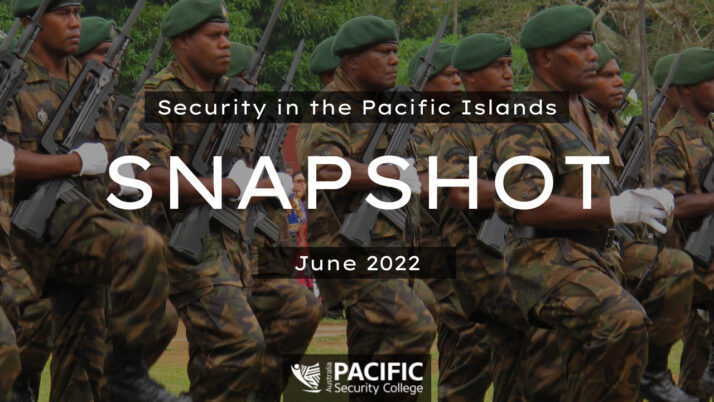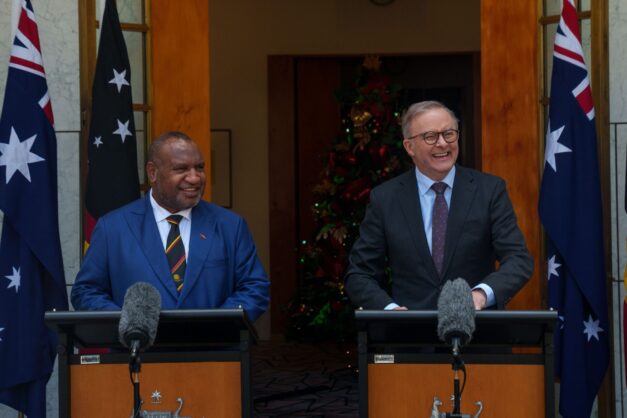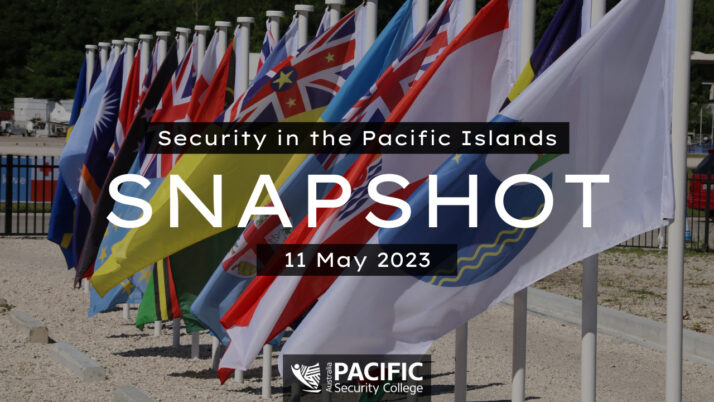Pacific Security Snapshot: 7 June 2022

Chinese Foreign Minister Wang Yi’s whirlwind trip around the Pacific has dominated headlines, whilst Papua New Guinea’s election is just around the corner.
In early May, Solomon Islands announced that Chinese Foreign Minister Wang Yi would be visiting the country and potentially planning a broader regional visit. Minister Wang subsequently undertook an ‘unprecedented’ regional tour, visiting eight countries in 10 days, including Solomon Islands, Kiribati, Samoa, Tonga, and Fiji. In the process, China signed a number of bilateral security and economic agreements with Pacific countries.
The trip was headlined by a meeting between China and its diplomatic allies in the Pacific. At the meeting, Minister Wang presented the China-Pacific Island Countries Common Development Vision, a region-wide proposal covering policing, security and communications cooperation, whilst dramatically expanding China’s relationships in the region.
Reactions from Pacific Island leaders on the agreement were mixed. In an open letter, Federated States of Micronesia President David Panuelo criticised the proposal, calling it a ‘threat to regional security’. Samoan Prime Minister Fiamē Naomi Mata’afa expressed her view that any issue affecting the region as a whole should go through the Pacific Islands Forum (PIF). Palau’s President Surangel Whipps Jr – whose country does not recognise the People’s Republic of China – said Pacific Island countries should ‘be cautious’ in their dealings with Beijing.
As a result of this discontent, the agreement has been abandoned for now, with China agreeing to have further discussions and consultations to shape consensus.
Wang Yi’s trip coincided the first visit to the Pacific by new Australian Foreign Minister Penny Wong. Minister Wong held meetings with Fijian Prime Minister Frank Bainimarama, as well as PIF Secretary-General Henry Puna.
After visiting Fiji, Minister Wong travelled to Samoa, where she met with Prime Minister Mata’afa and announced a new eight-year partnership between the two countries to address human development, as well as the donation of a Guardian class patrol boat by Australia. She then carried on to the Kingdom of Tonga to meet with the country’s prime minister and foreign minister.
However, China and Australia weren’t the only foreign powers making waves in the Pacific, as the European Union announced a resolution to strengthen its defence and security engagement in the region. As part of the announcement, the European Union’s envoy to the Pacific outlined the bloc’s intention to become more than just a “development partner” for Pacific Island countries.
In Fiji, the Russian superyacht saga has finally come to a conclusion. The United States has been granted permission to seize the yacht, which is believed to be owned by a sanctioned Russian oligarch, after Fiji’s Appellate Court dismissed an appeal to deny the seizure, paving the way for it to be sailed to American waters.
Papua New Guinea’s (PNG) election is just around the corner, with voting to begin on 2 July.
According to Bougainville President Ishmael Toroama, this will be the last election that his autonomous region will take part in, before working with the PNG parliament on an independence solution.
The election will be supported by more than 100 Australian Defence Force (ADF) personnel, who will be assisting with election security. The ADF also visited the Lombrum Naval Base in Manus Island, assisting PNG defence personnel with maintenance and inspections of their communication systems.
The New Zealand government has made the decision to extend the deployment of five of its Defence Force personnel in Solomon Islands by an additional 12 months. This decision was made upon request from the Solomon Islands Government in 2021.
In climate security news, Vanuatu has become the first Pacific Island country to declare a climate emergency, whilst in Guam a number of civil society groups have disclosed plans to sue the United States Navy and Fish and Wildlife Service. The goal of this lawsuit is to stop ongoing construction of an American machine gun range, as well as the relocation of 5,000 marines to the territory. The groups claimed that this military expansion would endanger 15 native species and destroy pristine forest habitat.
Finally, a Supreme Court Justice in Samoa has called on the government to appoint a task force to deal with the growing drug problem in the country.
Compiled by the team at the Pacific Security College, the Pacific security snapshot series highlights the human, environmental and traditional security developments that are shaping the region every fortnight. The information in this piece is accurate as of 9pm (AEST), Friday 3 June.
More Stories

Blog - 11 Dec 2023
A PNG-Australia security framework: not a treaty but solid nonetheless
Papua New Guinea PM James Marape and Australian PM Anthony Albanese face the media after signing a historical Bilateral Security Agreement on 7 December in Canberra. Credit: PM Albanese Facebook On 7 December 2023, the prime ministers of Australia and Papua New Guinea signed an historic security agreement in Canberra. It has taken approximately…

Security Snapshot - 11 May 2023
Pacific Security Snapshot | 11 May 2023
The security stories shaping the region ➣ Australia announces Pacific support package ➣ United States President Joe Biden to visit the Pacific ➣ Embassy of the United States opens in Tonga ➣ Chinese Special Envoy for the Pacific visits Samoa ➣ 14th Pacific Heads of Health meeting in Fiji ➣ Violence in Papua New Guinea’s Porgera…






